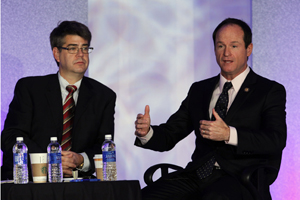Congressmen See ‘Piecemeal’ Approach Boosting Trucking’s Natural Gas Use

ARLINGTON, Va. — Two congressmen said the most feasible way to pass legislation to boost trucking’s use of natural gas is a “piecemeal” approach, rather than comprehensive legislation.
They cited specific issues of concern to the trucking industry such as exemptions for the extra weight of natural gas fuel tanks and excise tax modifications to compensate for the extra cost of natural gas-powered vehicles.
“This is a divided government,” said Rep. Lee Terry (R-Neb.), who is preparing a natural gas bill for the next congressional session that will address the fuel’s use in the trucking industry. “The best way I see right now [for a natural-gas bill] is a piecemeal approach, to find those areas we can agree on.”
Terry and Rep. John Sullivan (R-Okla.), who spoke at a panel discussion Friday morning at American Trucking Associations’ Summit on Natural Gas in Trucking, said that, Democrats and Republicans in Congress cannot agree on a broad-based approach to natural gas in transportation. They said, however, there are many smaller issues on which all sides can agree.
Terry said that with all of Congress’ attentions currently focused on the looming “fiscal cliff,” he does not know when his bill will be introduced, but said it will be after discussions with other lawmakers and with groups who support or have voiced reservations about the growing use of natural gas.
Sullivan introduced the comprehensive Natural Gas Act in the current congressional session that ends in January. The bill had 181 co-sponsors from both political parties but was never voted on.
A similar measure in the Senate had the support of 52 Senators, including Republicans and Democrats.
That bill included tax credits for truck makers, buyers of natural gas vehicles and for building natural gas fueling stations.
The congressmen said that to “incentivize” the use of natural gas in the trucking industry, a bill should include weight exemptions for fleets, because natural gas fuel tanks are heavier, and possibly provide a credit on the federal excise tax on trucks that reflects the higher price of natural gas powered trucks versus conventional units.
Sullivan — who is stepping down in January — said he did not consider such tax credits to be subsidies but agreed that Congress is in no mood to help underwrite the use of natural gas or write comprehensive legislation.
“Frankly, at some point in time, we’re going to have to have a sit down with . . . environmental organizations with the idea of saying, ‘Look, we’re moving forward, do you want your input in here?’” Terry said.




